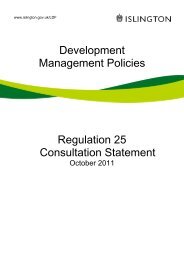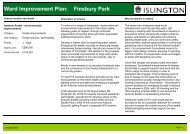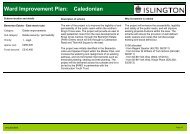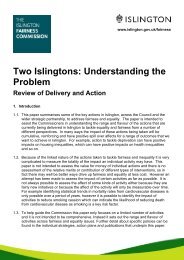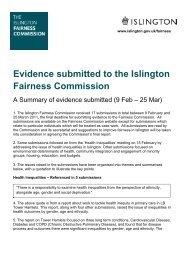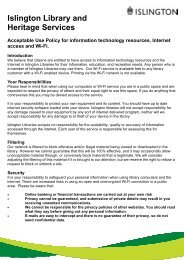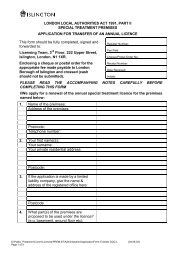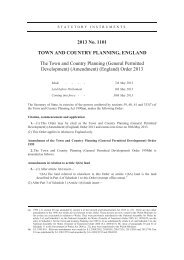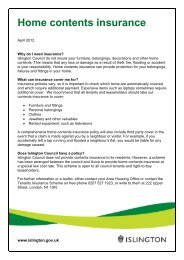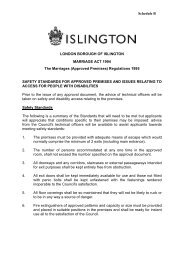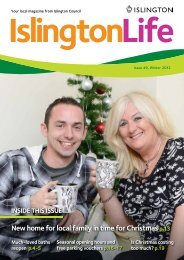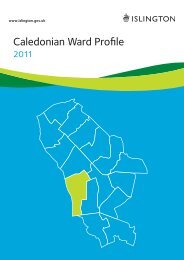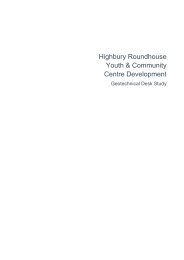Development Management Policies - Direction of ... - Islington Council
Development Management Policies - Direction of ... - Islington Council
Development Management Policies - Direction of ... - Islington Council
You also want an ePaper? Increase the reach of your titles
YUMPU automatically turns print PDFs into web optimized ePapers that Google loves.
7 Shops, Leisure and Services<br />
iv) the proximity to education uses.<br />
7.0.11 Due to the borough's densely developed, mixed-use nature, much night-time activity occurs<br />
close to places where people live. While this can make a positive contribution, a<br />
concentration <strong>of</strong> night-time uses can change the character <strong>of</strong> the area and reduce the<br />
range <strong>of</strong> shops or the quality <strong>of</strong> the shopping environment. The council will seek to prevent<br />
concentrations <strong>of</strong> uses that would harm an area's attractiveness to shoppers or its<br />
residential amenity. The council may resist the concentration <strong>of</strong> food, drink and<br />
entertainment uses where they cause harm to the character, function and amenity <strong>of</strong><br />
residents within an area.<br />
7.0.12 Night-time activities can contribute positively to the vitality and vibrancy <strong>of</strong> town centres.<br />
They can improve levels <strong>of</strong> safety and perceptions <strong>of</strong> personal safety <strong>of</strong> an area by providing<br />
informal surveillance for passers-by. However, if not properly managed they can result in<br />
adverse effect on the surrounding neighbourhood with adverse amenity effects generated<br />
from noise and anti-social behaviour.<br />
7.0.13 The council will ensure that development <strong>of</strong> shopping, services, food, drink, entertainment<br />
and other town centre uses do not cause harm to the character, function, vitality and<br />
viability <strong>of</strong> a centre, engender social exclusion or harassment, or damage the local area<br />
or the amenity <strong>of</strong> neighbours.<br />
7.0.14 When considering applications for hot food takeaways proximity to educational<br />
establishments will be taken into account with a view to protecting children’s health.<br />
Applications for hot food takeaways in close proximity to schools will be refused.<br />
7.0.15 The council would like to see a wide range <strong>of</strong> entertainment and cultural uses within its<br />
centres, not just those that primarily involve drinking, and will encourage suitable uses<br />
that contribute towards this.<br />
7.0.16 The council acknowledges that conflicts between uses can <strong>of</strong>ten be adequately managed<br />
using its statutory duties under the Licensing Act 2003, rather than by regulating planning<br />
use classes. As such, and to ensure consistency in decision-making, the policy provides<br />
flexibility in determining appropriate locations for entertainment uses, and requires the<br />
council’s statement <strong>of</strong> licensing policy to be a key consideration in assessing proposals.<br />
7.0.17 The council considers that some types <strong>of</strong> shops and services (referred to as key local<br />
shops) should be easily accessible to all residents, and will encourage their provision<br />
across the borough and resist their loss. These key local shops comprise: butcher, baker,<br />
greengrocer, grocer, fishmonger, chemist, post <strong>of</strong>fice, newsagent/confectioner, <strong>of</strong>f-licenses,<br />
dry cleaners and laundrette.<br />
<strong>Development</strong> <strong>Management</strong> <strong>Policies</strong> - <strong>Direction</strong> <strong>of</strong> Travel <strong>Islington</strong> <strong>Council</strong><br />
81



